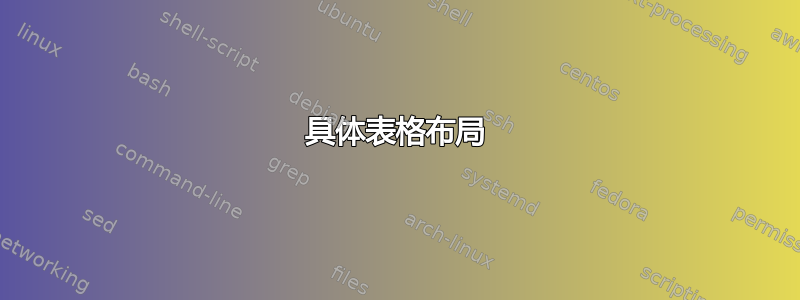
我想绘制这样的表格:

表格宽度是线宽的一部分,例如 0.8 * 线宽。但我不知道该怎么做。
任何人?
编辑:MWE:
\documentclass[a4paper,12pt,headsepline]{report}
\geometry{left=2cm, right=2cm, top=2.5cm, bottom=2cm}
\linespread {1.25}\selectfont
\usepackage[nottoc]{tocbibind}
\frenchspacing
\usepackage{tabularx}
\usepackage{longtable}
\usepackage{booktabs}
\usepackage{geometry}
\begin{document}
%...
% need table here
% ...
\end{document}
答案1
\documentclass{report}
\usepackage{ragged2e,array}
\newcommand\MC[1]{\multicolumn{2}{|c}{%
\tabular{@{\quad} >{\Centering}p{\dimexpr2.5cm} @{\quad}}
CPU targets,\\byte offset #1\endtabular}}
\begin{document}
\begin{tabular}{*4{| p{1.25cm} | >{\RaggedLeft}p{1.25cm} }| }
31 & 24 & 23 & 16 & 15 & 8 & 7 & 0\\\hline
\MC3 & \MC2 & \MC1 & \MC0 \vrule\\\hline
\end{tabular}
\end{document}

答案2
和bytefield您可以轻松获得帮助
\documentclass{article}
\usepackage{bytefield}
\begin{document}
\begin{bytefield}[bitheight=8ex,endianness=big]{32}
\bitheader{31,24,23,16,15,8,7,0}\\
\bitbox{8}{CPU targets,\\ byte offset 3}
\bitbox{8}{CPU targets,\\ byte offset 2}
\bitbox{8}{CPU targets,\\ byte offset 1}
\bitbox{8}{CPU targets,\\ byte offset 0}
\end{bytefield}
\end{document}

答案3
以下是使用低级命令的实现:
\documentclass{article}
\makeatletter
\newcommand{\bitstable}[5][\columnwidth]{%
$\m@th\vcenter{\vbox{\bits@table{#1}{#2}{#3}{#4}{#5}}}$%
}
\newcommand\bits@table[5]{%
\offinterlineskip
\@tempdima=#1\relax
\advance\@tempdima-4\p@
\@tempdima=.25\@tempdima
\tabskip=\z@
\halign{%
\vrule##\hfil&
##&
\hfil\vrule##\hfil&
##&
\hfil\vrule##\hfil&
##&
\hfil\vrule##\hfil&
##&
\hfil\vrule##\cr
&
\footnotesize\rlap{\,31}\hfil\vrule\hfil\llap{24\,}&
&
\footnotesize\strut\rlap{\,23}\hfil\vrule\hfil\llap{16\,}&
&
\footnotesize\strut\rlap{\,15}\hfil\vrule\hfil\llap{8\,}&
&
\footnotesize\strut\rlap{\,7}\hfil\vrule\hfil\llap{0\,}&
\cr
height 1pt&\hfil\vrule\hfil&&\hfil\vrule\hfil&&\hfil\vrule\hfil&&\hfil\vrule\hfil&\cr
\noalign{\hrule height 0.8pt}
width0.8pt height 3pt&&
width0.8pt&&
width0.8pt&&
width0.8pt&&
width0.8pt\cr
width0.8pt&
\bits@tablebox{#2}&
width0.8pt&
\bits@tablebox{#3}&
width0.8pt&
\bits@tablebox{#4}&
width0.8pt&
\bits@tablebox{#5}&
width0.8pt\cr
width0.8pt height 3pt&&
width0.8pt&&
width0.8pt&&
width0.8pt&&
width0.8pt\cr
\noalign{\hrule height 0.8pt}
}%
}
\newcommand{\bits@tablebox}[1]{%
\parbox{\@tempdima}{\centering\strut#1\strut}%
}
\makeatother
\begin{document}
\noindent
\bitstable
{CPU targets\\ byte offset $3$}
{CPU targets\\ byte offset $2$}
{CPU targets\\ byte offset $1$}
{CPU targets\\ byte offset $0$}
\bigskip
\noindent
\bitstable[.8\linewidth]
{CPU targets\\ byte offset $3$}
{CPU targets\\ byte offset $2$}
{CPU targets\\ byte offset $1$}
{CPU targets\\ byte offset $0$}
\end{document}

答案4
这里,我介绍\boxit如何制作每个单独的框。它需要 3 个参数(文本、高位和低位)。它还有一个框宽度的可选参数,默认为 0.2\textwidth,因此 4 个框占用 0.8\textwidth。
\documentclass{article}
\usepackage{lipsum}
\usepackage[usestackEOL]{stackengine}
\def\mystrut{\rule[-2pt]{\fboxrule}{2ex}}
\newcommand\boxit[4][.2\textwidth]{%
\leavevmode\unskip%
{\small\sffamily%
\fboxsep=0pt%
\def\stacktype{L}%
\strutlongstacks{T}%
\def\stackalignment{r}%
\stackon{\def\stackalignment{l}%
\stackon{\def\stackalignment{c}%
\stackon{\fbox{\addstackgap[1pt]{\makebox[#1]{\Longunderstack{#2}}}}}{\mystrut}%
}{\mystrut\,#3}%
}{#4\,\mystrut}}%
\kern-.5\fboxrule\ignorespaces%
}
\begin{document}
\lipsum[1]
\begin{center}
\boxit{CPU targets,\\byte offset 3}{31}{24}
\boxit{CPU targets,\\byte offset 2}{23}{16}
\boxit{CPU targets,\\byte offset 1}{15}{8}
\boxit{CPU targets,\\byte offset 0}{7}{0}
\end{center}
\lipsum[2]
\end{document}



